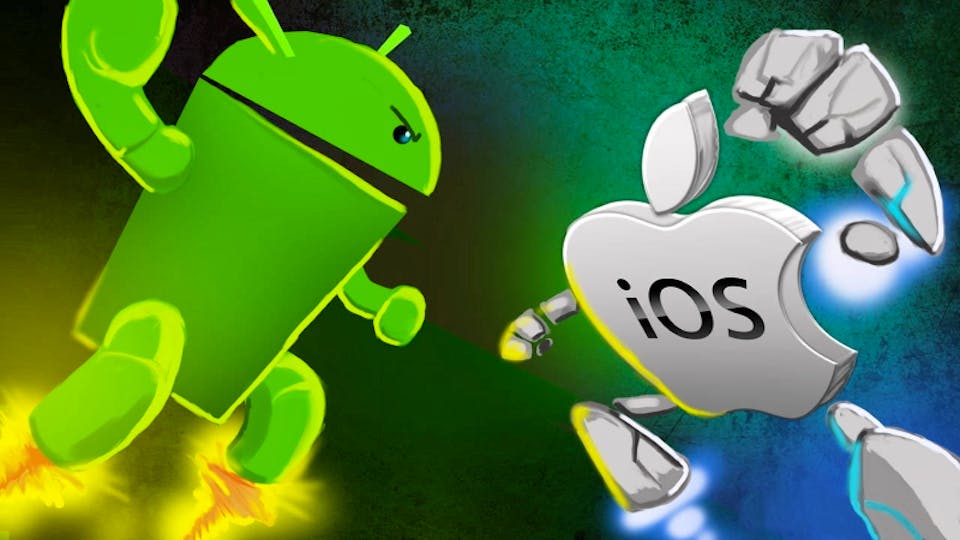Both iOS and Android are excellent pieces of software but they each have a number of pros and cons it's important to consider when your trying to decide which one to opt for.
This guide puts the two head-to-head comparing all of the most crucial categories to see which one comes out on top.
Android vs. iOS | Interface
Although Android has a reputation of being difficult to use, both it and iOS are really simple to navigate around. Their interfaces are pleasingly clean with apps appearing in a in a bright, rounded icons arranged in the standard row and column design.
While both have a home screen, it’s only on Android that you can customize it with widgets and your favourite apps. A second major Android exclusive feature is the App Drawer, where you’ll find every app you’ve ever downloaded arranged in alphabetical order normally by swiping down on the screen.
Android vs. iOS | Apps
There are more apps available to download on the Google Play Store than the iOS App Store, 3.5 million vs 2.1 million, but all of the big name ones like Facebook, Twitter, YouTube, Netflix, Spotify, Amazon and Gmail are on both.
The majority of new apps are still released on iOS first however, because it’s much easier for developers to create an app for the handful of Apple devices rather than the thousands that run Android. Mega-popular game Fornite for example finally arrived on Android in October 2019 seven months after it debuted on iOS.
Android vs. iOS | Gaming
Those who are serious about mobile gaming should opt for an iOS device. It might take a while for a game to arrive on Android after its debuted on iOS and some won't even appear at all. Smaller indie titles also might not work as well, running at a lower fps rate than their iOS counterparts for example, because again it’s too expensive to properly optimize them for every Android device.
Google are a lot less strict about the kind of apps which make it onto their Play Store which is definitely a double-edged sword. While it does give you a lot more choice, it also means that games containing harmful malware are more likely to slip through.
Android vs. iOS | Maps
Both Android’s Google Maps and iOS’s Apple Maps are excellent pieces of software. Both perform to an incredibly high degree of accuracy, offering you multiple walking, car and train routes all over the UK along with up-to-date traffic information.
You can select a location on either map to receive information like its opening hours and price range. If you’re not sure exactly where you want to go, you can search by a specific category like restaurants or bars to have all of those nearby displayed.
Android vs. iOS | Software updates
iOS and Android both regularly release updates but the former is the winner in this category because of the way in which Apple roll theirs out. All Apple devices receive the new iOS update at the same time while the new Android update trickles down to all the different devices much more slowly.
The latest, flagship smartphones from major Android smartphone manufacturers like Samsung or Google will receive the new update as soon as its released but for older models, it can take months. Although Android Pie was released in August 2018, it only became available on the Samsung Galaxy S8 and S8+ in March 2019.
Android vs. iOS | Customization
The ability to really customize your device has always been a huge strength of Android. There’s really very little on the OS that’s locked in, leaving you to make as many big or small changes as you like. iOS is incredibly rigid in comparison, really only allowing you to rearrange the order in which your apps appear and switch your background wallpaper.
Examples of some of the changes you can make on Android include being able to set any web browser as the default, swap your SMS client and download a new lock screen app or home launcher. Not only do these last two offer a complete design overhaul, but also the ability to create your own swiping gestures and offer improved options for app drawer organization.
Android vs. iOS | Security
There are two factors which make Android a little more susceptible to security threats. The bar for entry to the Google Play Store is lower than it is for the iOS App Store meaning that it’s more likely to feature apps containing harmful malware. Not all Android devices receive new updates simultaneously, so it might be a while before older models receive protection against a new threat.
That’s not to say you’re going to have your credit card information stolen if you use Android. This malware infects a very tiny percentage of users and there’s lots now working to keep you safe. Google Play Protect automatically conducts scans of your device to check everything’s okay and there’s a great variety of highly-effective antivirus software to choose from.
Android vs. iOS | Which mobile OS is best?
iOS does come out on top in four of our seven categories, apps, gaming, software updates and security, while interface and maps are a draw, but that doesn’t necessarily mean Apple’s offering is the most suitable for everyone.
Which is best out of Android and OS really comes down to personal preference. The fact that Android devices offer an impressive degree of customization will be the most important element to some while others will be more attracted to a device they can enjoy all of the latest games on.










